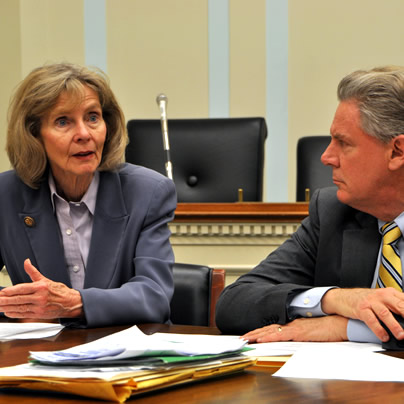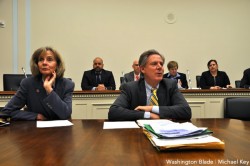National
More pressure on Obama to bar workplace discrimination
House Democrats call on president to issue executive order

Supporters of an executive order barring discrimination against LGBT federal workers were buoyed this week by the results of a new poll showing that 73 percent of Americans support such a measure.
Brian Moulton, legal director for the Human Rights Campaign, talked about the polling unveiled earlier this week by his organization during a briefing for staffers Thursday on Capitol Hill, saying support for the order comes from a diverse array of demographic groups — including conservatives.
“Rarely do we have support from this range of groups of people,” Moulton said. “The lowest support, which was 60 percent of support for the executive order, was among self-identified conservatives.”
Support came from 61 percent of Republicans, 72 percent of people 65 and older, 80 percent among black Americans, 72 percent among Hispanics, 77 percent of Catholics and 64 percent of born-again Christians.
“I think the data both on the executive order specifically, but the long-standing public polling we’ve had on the issue of non-discrimination over the years, shows that this is something that very much the American people support, and I think that’s also reflected in the fact that we have such strong support in corporate America,” Moulton said.
Other data, Moulton said, reveals that most people think federal workplace non-discrimination protections for LGBT people already exist. According to the poll, 87 percent think it’s illegal to discriminate against LGBT people in the workplace — even though no such law exists.
The survey of 800 likely voters nationwide was conducted for HRC by Greenberg Quinlan Rosner Research from Nov. 9 to Nov. 13, 2011. Even though the poll was conducted in November, the findings were published just this week.
Moulton was among five LGBT rights supporters who spoke on the panel, which was staged by the LGBT Equality Caucus and geared toward encouraging President Obama to issue an executive order requiring companies doing business with the U.S. government to have non-discrimination policies inclusive of sexual orientation and gender identity.
Because the measure is similar in its goal to the Employment Non-Discrimination Act, the directive has sometimes been referred to as the “ENDA” executive order, although the order would be more limited in scope because it only affects federal contractors.
Multiple sources, speaking on condition of anonymity, have told the Blade the Labor and Justice Departments have cleared such a measure. The White House hasn’t said whether it will issue the executive order.

Reps. Lois Capps (left) and Frank Pallone speak before a panel of LGBT advocates (Blade photo by Michael Key)
Joining supporters during the briefing were Reps. Frank Pallone (D-N.J.) and Lois Capps (D-Calif.), who are circulating a letter among House Democrats calling for President Obama to issue the executive order.
Pallone said the executive order is needed to address the lack of workplace protections for LGBT workers.
The lawmaker said the ultimate goal is passage of ENDA, but the scenario is unlikely given the current leadership of the House.
“I think it’s fair to say it has probably no chance of passage whatsoever with the Republicans in control of the House,” Pallone said. “With the federal contractors, this is something we think we can do in the interim to set a precedent and help a lot of people, knowing full well that what we’d really like to see is ENDA.”
Capps said issuing the executive order would be in line with Obama’s decision to issue executive orders to facilitate job opportunities while most legislation remains deadlocked in a divided Congress.
“He’s calling it ‘We Can’t Wait,'” Capps said. “This is one more step he can take toward the agenda of clearly that’s something in the interest of the American public.”
Pallone and Capps are the initial signers of the letter they are circulating among colleagues — along with retiring Rep. Barney Frank (D-Mass.). They’ve set the deadline for signing the letter on Friday in anticipation of publication next week. An informed source told the Washington Blade the letter has attracted about 50 signatures as of Thursday.
Others on the panel presented different cases for why Obama should have no problem issuing the executive order and the extent to which it would facilitate non-discrimination in the workplace.
Tico Almeida, president of Freedom to Work, said companies that lack LGBT-inclusive non-discrimination policies can institute them easily and that most companies that haven’t done so have yet to make the change out of “laziness.”
“With President Obama’s order, I predict 100 percent compliance; I don’t think a single company is going to put at risk its livelihood in order to keep discriminating,” Almeida said.
Citing instances of workplace discrimination in which having the executive order already in place would be helpful, Almeida said the directive would allow the Obama administration to search actively for workplace discrimination without having to wait for individuals to file complaints.
“In a certain limited sense, the executive order is better than a civil rights act,” Almeida said. “Under the Civil Rights Act, an investigation can only start if the affected person files a complaint. Under the executive order, the Department of Labor can be proactive, go out and do investigations, find discrimination without the person filing — and that happens a lot.”
Almeida also articulated a sense of urgency in issuing the executive order, saying it would take at least six months for implementation of the policy. That process could be disrupted if a Republican defeats Obama in the upcoming election.
“There will after that be a process of no less than six months — six months is really optimistic — in which the Department of Labor will research and draft those rules implementing the executive order, and those rules will include all the minutiae with a host of different issues that we often hear as excuses not to do ENDA,” Almeida said.
The process involves a 90-day comment period where concerned parties — such as businesses and LGBT groups — can weigh in, followed by revisions based on the comments and the final rule being published in the Federal Register, Almeida said.
Deborah Vagins, American Civil Liberties Union’s senior legislative counsel for civil rights, talked about the history of other non-discrimination orders issued by earlier presidents — noting that President Franklin Roosevelt issued the first such directive based on race, creed, color or national origin for defense contractors.
“In 1941, some of our earlier civil rights leaders were preparing for a march on Washington to integrate the armed forces,” Vagins said. “Unfortunately, while full integration of the armed forces was not achieved at that time, during meetings between the administration and leaders of the march, Roosevelt agreed to sign this landmark EO prohibiting discrimination in federal defense contracting.”
The directive has been expanded by later presidents — most recently President Lyndon Johnson — to include all federal contractors and more categories of workers.
Nan Hunter, a lesbian law professor at Georgetown University and legal scholarship director at the Williams Institute of the University of California, Los Angles, said the authority for Obama to issue the executive order is sound under the Federal Property & Administrative Services Act, or the Procurement Act.
“There has never been a court decision that has struck down any of the anti-discrimination provisions in a federal executive order on the grounds that they did not advance the economy and efficiency of government operations,” Hunter said.
Jeff Krehely, vice president for LGBT programs at the Center for American Progress, presented findings from the institute published in November on the impact that ENDA would have on small businesses.
According to the findings, most small businesses already have non-discrimination protections. Seven out of 10 small businesses already prohibit discrimination against gay employees, and six out of 10 prohibit discrimination against transgender employees.
“It’s really a good news story out of the small business community because it shows that they are of a fair mindset when it comes to workplace equality,” Krehely said. “They recognize the fact that in today’s economy and today’s world the more inclusive and open you are, the better it is for your business, and this really translates into better recruitment and retention practices, less turnover — all the things that can disrupt a business of any size really.”
For small business that didn’t have the protections, Krehely said the response was that these companies didn’t think to institute them or didn’t think they had LGBT employees.

The Comings & Goings column is about sharing the professional successes of our community. We want to recognize those landing new jobs, new clients for their business, joining boards of organizations and other achievements. Please share your successes with us at [email protected].
Congratulations to Gil Pontes III on his recent appointment to the Financial Advisory Board for the City of Wilton Manors, Fla. Upon being appointed he said, “I’m honored to join the Financial Advisory Board for the City of Wilton Manors at such an important moment for our community. In my role as Executive Director of the NextGen Chamber of Commerce, I spend much of my time focused on economic growth, fiscal sustainability, and the long-term competitiveness of emerging business leaders. I look forward to bringing that perspective to Wilton Manors — helping ensure responsible stewardship of public resources while supporting a vibrant, inclusive local economy.”
Pontes is a nonprofit executive with years of development, operations, budget, management, and strategic planning experience in 501(c)(3), 501(c)(4), and political organizations. Pontes is currently executive director of NextGen, Chamber of Commerce. NextGen Chamber’s mission is to “empower emerging business leaders by generating insights, encouraging engagement, and nurturing leadership development to shape the future economy.” Prior to that he served as managing director of The Nora Project, and director of development also at The Nora Project. He has held a number of other positions including Major Gifts Officer, Thundermist Health Center, and has worked in both real estate and banking including as Business Solutions Adviser, Ironwood Financial. For three years he was a Selectman, Town of Berkley, Mass. In that role, he managed HR and general governance for town government. There were 200+ staff and 6,500 constituents. He balanced a $20,000,000 budget annually, established an Economic Development Committee, and hired the first town administrator.
Pontes earned his bachelor’s degree in political science from the University of Massachusetts, Dartmouth.
Kansas
ACLU sues Kansas over law invalidating trans residents’ IDs
A new Kansas bill requires transgender residents to have their driver’s licenses reflect their sex assigned at birth, invalidating current licenses.

Transgender people across Kansas received letters in the mail on Wednesday demanding the immediate surrender of their driver’s licenses following passage of one of the harshest transgender bathroom bans in the nation. Now the American Civil Liberties Union is filing a lawsuit to block the ban and protect transgender residents from what advocates describe as “sweeping” and “punitive” consequences.
Independent journalist Erin Reed broke the story Wednesday after lawmakers approved House Substitute for Senate Bill 244. In her reporting, Reed included a photo of the letter sent to transgender Kansans, requiring them to obtain a driver’s license that reflects their sex assigned at birth rather than the gender with which they identify.
According to the reporting, transgender Kansans must surrender their driver’s licenses and that their current credentials — regardless of expiration date — will be considered invalid upon the law’s publication. The move effectively nullifies previously issued identification documents, creating immediate uncertainty for those impacted.
House Substitute for Senate Bill 244 also stipulates that any transgender person caught driving without a valid license could face a class B misdemeanor, punishable by up to six months in jail and a $1,000 fine. That potential penalty adds a criminal dimension to what began as an administrative action. It also compounds the legal risks for transgender Kansans, as the state already requires county jails to house inmates according to sex assigned at birth — a policy that advocates say can place transgender detainees at heightened risk.
Beyond identification issues, SB 244 not only bans transgender people from using restrooms that match their gender identity in government buildings — including libraries, courthouses, state parks, hospitals, and interstate rest stops — with the possibility for criminal penalties, but also allows for what critics have described as a “bathroom bounty hunter” provision. The measure permits anyone who encounters a transgender person in a restroom — including potentially in private businesses — to sue them for large sums of money, dramatically expanding the scope of enforcement beyond government authorities.
The lawsuit challenging SB 244 was filed today in the District Court of Douglas County on behalf of anonymous plaintiffs Daniel Doe and Matthew Moe by the American Civil Liberties Union, the ACLU of Kansas, and Ballard Spahr LLP. The complaint argues that SB 244 violates the Kansas Constitution’s protections for personal autonomy, privacy, equality under the law, due process, and freedom of speech.
Additionally, the American Civil Liberties Union filed a temporary restraining order on behalf of the anonymous plaintiffs, arguing that the order — followed by a temporary injunction — is necessary to prevent the “irreparable harm” that would result from SB 244.
State Rep. Abi Boatman, a Wichita Democrat and the only transgender member of the Kansas Legislature, told the Kansas City Star on Wednesday that “persecution is the point.”
“This legislation is a direct attack on the dignity and humanity of transgender Kansans,” said Monica Bennett, legal director of the ACLU of Kansas. “It undermines our state’s strong constitutional protections against government overreach and persecution.”
“SB 244 is a cruel and craven threat to public safety all in the name of fostering fear, division, and paranoia,” said Harper Seldin, senior staff attorney for the ACLU’s LGBTQ & HIV Rights Project. “The invalidation of state-issued IDs threatens to out transgender people against their will every time they apply for a job, rent an apartment, or interact with police. Taken as a whole, SB 244 is a transparent attempt to deny transgender people autonomy over their own identities and push them out of public life altogether.”
“SB 244 presents a state-sanctioned attack on transgender people aimed at silencing, dehumanizing, and alienating Kansans whose gender identity does not conform to the state legislature’s preferences,” said Heather St. Clair, a Ballard Spahr litigator working on the case. “Ballard Spahr is committed to standing with the ACLU and the plaintiffs in fighting on behalf of transgender Kansans for a remedy against the injustices presented by SB 244, and is dedicated to protecting the constitutional rights jeopardized by this new law.”
National
After layoffs at Advocate, parent company acquires ‘Them’ from Conde Nast
Top editorial staff let go last week

Former staff members at the Advocate and Out magazines revealed that parent company Equalpride laid off a number of employees late last week.
Those let go included Advocate editor-in-chief Alex Cooper, Pride.com editor-in-chief Rachel Shatto, brand partnerships manager Erin Manley, community editor Marie-Adélina de la Ferriére, and Out magazine staff writers Moises Mendez and Bernardo Sim, according to a report in Hollywood Reporter.
Cooper, who joined the company in 2021, posted to social media that, “Few people have had the privilege of leading this legendary LGBTQ+ news outlet, and I’m deeply honored to have been one of them. To my team: thank you for the last four years. You’ve been the best. For those also affected today, please let me know how I can support you.”
The Advocate’s PR firm when reached by the Blade said it no longer represents the company. Emails to the Advocate went unanswered.
Equalpride on Friday announced it acquired “Them,” a digital LGBTQ outlet founded in 2017 by Conde Nast.
“Equalpride exists to elevate, celebrate and protect LGBTQ+ storytelling at scale,” Equalpride CEO Mark Berryhill said according to Hollywood Reporter. “By combining the strengths of our brands with this respected digital platform, we’re creating a unified ecosystem that delivers even more impact for our audiences, advertisers, and community partners.”
It’s not clear if “Them” staff would take over editorial responsibilities for the Advocate and Out.



















